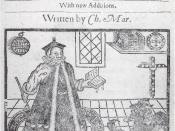Variation and contrast are vital aspects of Christopher Marlowe's play The Tragical History of Doctor Faustus used to sustain the attention of his audience. Marlowe employs these methods to a great extent in his play producing a variety of effects. Not only do these techniques increase and maintain interest in the audience, they are also used to increase suspense, highlight key themes, prominent issues and didacticism, develop characters and the plot.
The frequent variations in mood throughout the play increase and sustain the audience's interest. Though the drama is labeled "a tragical history" Marlowe utilizes comic relief. In doing so, he lightens the mood of the play and his audience with particular scenes. Constant misery is trying on an audience's attention as human nature demands comic relief throughout a tragedy. The play begins with a mood of splendor and ambition, initially capturing the audience as Faustus describes how he will use is his newfound power.
The protagonist discusses his aims:
"I'll levy soldiers with the coin they bring,
And chase the Prince of Parma from our land,
And reign the sole king of all our provinces..."
Though sympathy becomes a dominant feature of the mood as Faustus prepares to sell his soul, the mood darkens with despair and horror by the end of the play. Comedy arises with the foolishness as Faustus plays practical jokes and with the ridiculous antics and expressions of his servants Wagner, Robin and Ralph. The humour is shown by the ridiculousness of Faustus' practical joke played on the horse-courser:
Horse-courser: "So-ho, ho! so-ho, ho! [Holla's in his ear.] No, will you not wake? I'll make you wake ere I go. [Pulls Faustus by the leg, and pulls it away.]..."
Faustus: "...O, my leg, my leg!"
However, the principle mood of the play is tragedy and...


